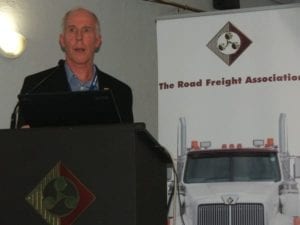The Road Freight Associations’ annual convention, attended by Simon Foulds, is a great place for the industry to discuss relevant issues and also provides operators and manufacturers the opportunity to interact in a relaxed atmosphere.
The underlying focus this year was that to operate efficiently you have to operate smartly – hence the theme of the convention being ‘Smarter Trucking’. Simon Foulds was interested to hear about the smart technologies in trucking, which were discussed by Paul Nordengen from the CSIR. Nordengen has been instrumental in driving the concept of ‘smart trucking’ in South Africa. In other parts of the world, this concept is referred to as Performance-Based Standards (PBS). Currently, there are 60 smart trucks in operation in South Africa,mainly within the lumber and mining industries. There are another 30 smart trucks in the design and approval phases and these will be implemented in transporting other commodities. Nordengen says: “The objective of smart truck technology for heavy commercial vehicles is essentially to reduce vehicle trips and improve the safety performance of the truck when fully laden. Smart truck technology also ensures less damage is done to the road infrastructure and the improved fuel efficiency of these vehicles also ensures a reduction in the amount of CO2 emissions. This technology will improve the overall performance of the heavy commercial vehicles used in South Africa. “At the same time, truck manufacturers along with the trailer manufacturers will start implementing the technology used in smart trucks, which are longer and heavier, within the normal trucks seen on our roads.” All the companies using smart trucks in South Africa are also participating in the road transport management system (RTMS). RTMS is an industry-led, voluntary self-regulation scheme that encourages consignees, consignors and transport operators engaged in the road logistics value chain to implement a vehicle management system that preserves road infrastructure, improves road safety and increases the productivity of the logistics value chain. This scheme also supports the Department of Transport’s National Freight Logistics Strategy.Driving smart trucks
Timber Logistics Services is one of the companies thathas incorporated smart trucks into its fleet. Brian Hunt, managing director, says: “It is a basic concept that makes sense for our industry. We had to modify the concept to suit our conditions, but applying the principles of smart trucking in the timber sector was quite easy. It definitely works well under the conditions the company operates in.” Gert Brits, general manager: mining services at Unitrans, adds: “Why should an operator implement the smart trucking technology?There are two major reasons: the improved safety handling of the vehicle and the improvement of the vehicle’s productivity. We operate on the mines and we are continually asked about the safety of the smart trucks we are using and we have proved to them just howsafe these vehicles are. And with the improved productivity, we are able to keep our logistics costs down– especially our fuel costs.” Adrian van Tonder, senior manager: business development at Barloworld Logistics, states: “We do not have any smart trucks currently on the road, but are looking at implementing some in the near future. When we reached the decision to include these trucks in our fleet it was all about understanding what PBS is all about. For us it is logical to incorporate these vehicles into our fleet because, as already stated, there is an overall improvement in safety, less wear and tear of the roads, less CO2 emissions and above all an improved productivity of the vehicle. It makes perfect business sense. “Good corporate citizens have to do something that contributes positively to the country and not just go out there simply to make money. PBS makes a positive and significant contribution to the overall well-being of the country. It is all about being a responsible citizen” Concludes Nordengen: “The biggest challenge with this project as we expand it – even though it is in its infancy stage – is that those operators using these trucks comply with their permits, ensuring they are on the right route at the right speed with the right load. This is the key to the success of this project.” Nordengen says: “This project is about doing things a lot smarter than they have ever been done before. It is going to take time to influence government and make itunderstand what it is we are trying to achieve with this project. You cannot expect it to happen overnight. Getting all the provinces involved is also important, but that is also going to take time. Our goal is to achieve 100 million kilometres of data and then present it to government and say we have done extensive tests over many years with many PBS vehicles operating in many different sectors in our country and theseare the results. If you do not have this kind of data to back it up, getting the government to change legislation and adopt smart trucks is going to be impossible. So this is a journey we are going through and it is a journey in the right direction. When you have the right data and the right kilometres travelled then you start having the good argument to encourage government to make positive changes.”





